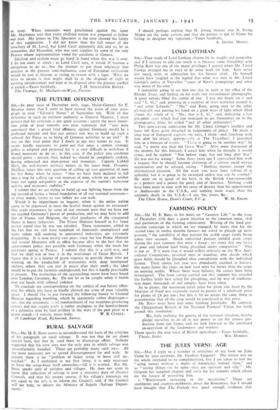THE FUTURE OFFENSIVE
your issue of December loth, 5940, Major-General Sir F.
Maurice states that I seem to have missed the point of your para- graph in your " Editorial Notes " of September 6th. With all due deference to such an eminent authority as General Maurice, I must protest that his criticism is not quite accurate ; surely the most impor- tant point of your remarks was your statement that " you were convinced that s grand land offensive against Germany would be a profound mistake and that our correct role was to build up such a colossal Air Force as to bring all German activities to an end." It
was on this vital point that I dwelt in my two letters to you. It seems hardly necessary to point out that once a certain strategic policy is adopted and prepared for it is very difficult to withdraw if found necessary to do so ; in this case, if the policy you condemn should prove a mirage, then indeed we should be completely undone, having exhausted our man-power and resources. Captain Liddell Harti the well-known military writer, in his latest book, Dynamic Defence, raises this very question of calling up vast quantities of men for the Army when he states: " that we have been inclined to fall into a trap by calling up vast reserves of men, whom we can neither nain nor equip adequately at the expense of the nation's industrial activity and economic stability."
I submit that we are trying to build up our fighting forces from the top instead of laying a broad foundation of all our national resources— in other words, trying to run before we can walk.
Would it be impertinent to inquire, when is the entire nation going to be organised to meet the fearful threat against its existence? One reads statements by some of our eminent men that we have not yet reached Germany's power of production, and we may have to add that of France and Belgium, the chief producers of the conquered States in heavy industries. The Prime Minister himself in his latest review stated that he was not satisfied. These statements, added to the fact that we still have hundreds of thousands unemployed and many others still working in unessential industries, are extremely disquieting. It is now nearly two years since the late Prime Minister and several Ministers still in office became alive to the fact that no appeasement policy was possible with Germany when she made her predatory spring at Prague. I submit that this is a civil war, and that we shall win or lose it in the workshops of Great Britain. I repeat that it is a matter of grave urgency to provide those who are working on the production of armaments with deep bombproof shelters, where they can rest in peace after their work ; the ideal would be to put the factories underground, but this is hardly practicable at present. The mutterings of the approaching storm have been heard over London, Coventry, &c. Do not let us be caught when it bursts over our heads with colossal violence.
To conclude my correspondence on the subject of our future offen-
sive, for which you have so kindly allowed me scme of your valuable space. I should like to put forward the following theory to General Maurice regarding bombing, which he apparently rather disparages— viz., that the systematic .1e:ial bombardment of our munition-producing centres and our supply ports is rather analogous to the bombardment of a defensive zone by land artillery in the wars of the past prior to a






























 Previous page
Previous page